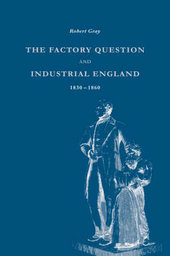
|
The Factory Question and Industrial England, 1830-1860
Hardback
Main Details
Description
The Factory Question and Industrial England addresses the continuing controversy over industrialisation. It investigates different perceptions of the 'factory system' either as a threat or a promise, and the contested meanings of waged work in industry. Making use of a great variety of sources, such as sermons, medical treatises, fictional and visual representations, Robert Gray places the languages of debate in their cultural contexts, paying particular attention to the shifting constructions of class and gender in the rhetoric of reform, and the ambiguities and tensions inherent in 'protective' legislation. He then relates patterns of conflict over factory legislation to the features of specific industrial towns. The combination of regional, cultural and textual analysis makes this book a coherent and original contribution to the study of industrial Britain in the nineteenth century.
Reviews"Robert Gray has written an important book. It is so in its own right and as a contribution to the historiography of the factory system, a subject at the core of the exciting new work being done on nineteenth-century soical and political history...Gray's engrossing book is not one for specialists alone. It should be read by any scholar with a serios interest in mid-nineteenth-century Britain, involving as it does its culture, economy, society, and polity." John G. Rule, Albion "Gray's well-researched, thoughful analysis of the development of industrial culture in the cotton and woolen manufacturing areas of Lancashire and the West Riding of Yorkshire, primarily in the 1830s and 1840s, draws on a wide variety of primary and secondary sources...At the core of Gray's persuasive argument is an effort to reinsert the importance of the industrial experience with its factories, workers, and employers as critical to the formation of the interventionist Liberal state, remnants of which survived until the challenges of the Thatcher era. The result is a clear, literate contribution to the ongoing debate about the meaning of class, gender, and regionalism during the industrial revolution." R.A. Soloway, Choice "Gray's study is well-researched and he presents many useful insights into the textile districts." Geoffrey Tweedale, Business History Review "...one cannot help but marvel at the overall quality of the scholarship that he has synthesized and that historians in Britain continue to produce about this venerable topic." Thomas E. Leary, Technology and Culture "The book presents a wealth of details...The strength of the book is in its careful analysis of various players in the drama, based on extensive use of primary sources." Joyce Burnette, Journal of Economic History "...an important book...It should be read by any scholar with a serious interest in mid-nineteenth century Britain." Albion "Robert Gray has writen an important book. It is so in its own right and as a contribution to the historiography of the factory system, a subject at the core of the exciting new work being done on nineteenth-century social and political history. He proves himself...among other historians of the nineteenth-century factoru system who can write intelligently and effectively about class and gender without bringing to the task preconceived exclusionist approaches. The book is also important in correcting the too-eager rush to reduce the significance of the factory system, a response to the economic historians' emphasis on gradualism and continuity in place of the traditional 'industrial revolution.' Gray's engrossing book is not one for specialists alone. It should be read by any scholar with a serious interest in mid-nineteenth-century Britain, involving as it does its culture, economy, society, and polity." John G. Rule, Albion "Robert Gray has written an excellent reassessment of a much -written about area of English history. His current work is a model of incisive and lucid analysis... Robert Gray's book provides a fresh and stimulating approach to a well-worked area. It is a book which historians concerned with other periods or other places not only can profit from but can also enjoy." Chris Wrigley, Labor History "...an excellent reassessment of a much-written about area of Englosh history...rich in detail yet broad in the issues it dicusses. It is a valuable contribution to the study of the history of the British industrial relations. Labour History "...an important contribution to a series of ongoing debates over British industrial formation. ...it will be regarded as a path-breaking study. Gray has provided a rich picture of the linguistic complexities of the creation of new industrial indentities..." Martin Hewitt, Victorian Studies
|